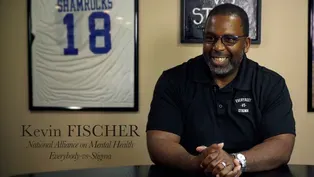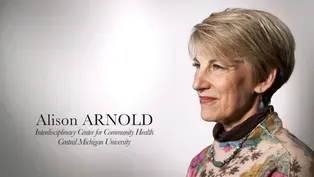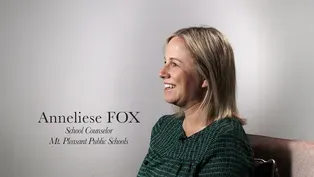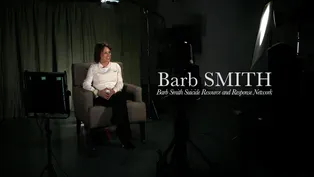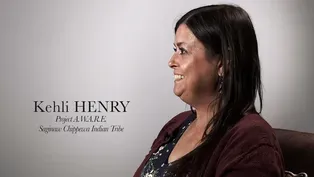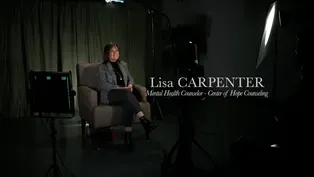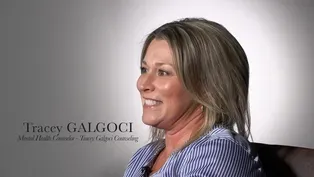Special Programs
Adapting to Adversity: Youth Mental Health
Episode 19 | 26mVideo has Closed Captions
Join local mental health experts as they weigh in on this crisis happening to our youth.
Join local mental health experts as they weigh in on this crisis happening to our youth right here in mid-Michigan. They will speak about how we can better understand youth mental health as a community and how we can aid in the prevention of some cases. Plus, we will identify treatment options that are best for our young people.
Problems with Closed Captions? Closed Captioning Feedback
Problems with Closed Captions? Closed Captioning Feedback
Special Programs is a local public television program presented by WCMU
Special Programs
Adapting to Adversity: Youth Mental Health
Episode 19 | 26mVideo has Closed Captions
Join local mental health experts as they weigh in on this crisis happening to our youth right here in mid-Michigan. They will speak about how we can better understand youth mental health as a community and how we can aid in the prevention of some cases. Plus, we will identify treatment options that are best for our young people.
Problems with Closed Captions? Closed Captioning Feedback
How to Watch Special Programs
Special Programs is available to stream on pbs.org and the free PBS App, available on iPhone, Apple TV, Android TV, Android smartphones, Amazon Fire TV, Amazon Fire Tablet, Roku, Samsung Smart TV, and Vizio.
Providing Support for PBS.org
Learn Moreabout PBS online sponsorship- [Announcer] Support for WCMU comes from behavioral health services at My Michigan Health.
Providing mental health services when emotions become unmanageable, causing loss of sleep, nonstop worry, and depression.
More at mymichigan.org/mental health.
- [Narrator] Support for WCMU comes from Community Mental Health for Central Michigan, serving community residents for over 40 years.
Now offering Moodfit, a whole health wellness app available on their website.
Learn more at cmhcm.org.
- [Narrator] Support for WCMU comes from the Michigan Health Improvement Alliance, uniting community partners to improve healthcare and economic sustainability across 14 counties in central and eastern Michigan through its THRIVE portfolio.
Learn about THRIVE at ThriveGreatLakesBay.org.
- We say one in five adults, one in six children experience a mental health crisis in a given year.
That's almost 80 million people.
It is normalizing the conversation.
We should be talking about mental health or mental illness at the dinner table, at the breakfast table, like we talk about anything else.
- The easiest way, sometimes that I can think about it is this affecting their ability to live, laugh, learn, and love.
- Trauma affects everybody, but especially kids in terms of trying to recognize that mental health is not just like this island on its own, that you can address.
You really have to look at your physical health your social health.
If you're not well, physically it's gonna be harder for you to be well mentally.
- One good thing about raising awareness, we have to take the mental wellbeing of youth as seriously as we take their physical wellbeing.
That message is getting out.
- Mind, body, soul, like we need not only to take care of our physical health, but also our mental health.
- Mental illness is treatable.
Depression is treatable.
Anxiety is treatable, but we have to address it, acknowledge it and not shame it.
- Dominique is what I describe as an all-American kid.
Great personality, great people skills, well liked by everyone.
He was very little trouble to his mom and I.
Three sport athlete.
He was just this incredibly naturally bright kid.
All of his coaches said the same thing.
He's a coach on the field.
Dominique was what we called a game changer.
We could put Dominique on the toughest kid to defend on football field or basketball court, and he would go out, and I would literally tell him, "I don't wanna see that kid score another point today, he scored enough."
And he would just say, "Okay, dad."
Dominique was a sophomore at John Carroll University and came home for Thanksgiving break, and was just not himself.
And frankly, our assumption was that maybe he'd gone off to school and experimented with some drugs and had a bad reaction.
So we took him to the hospital to be drug tested.
And after a lengthy examination, the doctors came out and said, "There's no drugs or alcohol in his system, but we're gonna put him on a 72-hour psychiatric hold."
And for our family, it was literally like hitting a brick wall at a hundred miles an hour.
We had never seen any behavior in him that made us think that he was experiencing any kind of mental health issues.
(gentle music) - It does appear that mental health challenges and conditions in our youth is on the rise.
25% of our high school students had seriously thought about suicide.
And one in 10 had indicated that they had attempted it.
So these are really alarming kind of indicators that there is a challenge there.
- That is something that we are trying to work really hard at.
Having students just feel more comfortable talking about mental health.
So we do a lot of programming inside the classroom and the other counselors and I are very visible inside the school.
So we're at lunch, sometimes we're in the hall a lot so that they get comfortable talking about issues related to mental health.
And just knowing too that we all have mental health.
- I think there's been a lot of discussion around anxiety in particular at all age levels.
Another significant issue that we hadn't planned on was COVID right.
So a lot of kids were outta school for a long time.
Maybe kids aren't learning the social, or didn't learn the social skills that they would have if they were in school full time.
I guess, skills on how to be successful in school.
What is they even like going to school, especially for some of those younger kids who maybe never went to school during a normal school year before COVID hit.
- For the last two years, they've had to be really flexible because they really haven't known what's going to happen from month to month or week to week.
And so it's caused a pretty big disruption in their social and emotional development.
It's caused a big disruption in their academics.
And so kind of getting back into the swing of things there have been some growing pains probably with it but youth are very resilient.
- The treatment of some of these exposures really begins with awareness all along the continuum as children enter into years where they aren't feeling well, they have this stress, no adults are around to really talk to about it, but boy, that peer networks there, and yeah, I can start smoking or trying out these substances, and for a short while it kind of dulls everything or numbs.
And then unfortunately over time those patterns get set.
Being aware of what's one's feeling and being aware as an adult of the kinds of things that are happening in children's lives that we can address, and that we can take action to provide supports is the very beginning.
- Dominique was initially diagnosed with schizophrenia and shortly after, they added the diagnosis of bipolar disorder.
And so we struggled to understand what that meant and then how to best help him.
And after a while, it seemed like he was on a good path.
We had figured out the medications, we thought, he was in therapy, things were going well.
We very quickly learned how little we knew about mental illness, the mental healthcare system, treatment plans, really what his life was gonna look like forward.
- I think the idea that coming to counseling is a sign of weakness is still a stigma that exists.
The idea that asking for help means I'm not strong, right?
That a sign of weakness.
I should be able to handle it on my own.
So I think there's some of that that still exists.
Kids don't come in with any sort of preconceived idea about what counseling is supposed to look like, right?
So adults sort of understand the process.
I'm supposed to talk, we're gonna sit here, we're gonna talk about feelings and things that are uncomfortable.
Trust is sort of pretty easily built.
Kids have none of that.
They're like, you're a stranger.
So you have to give me a reason to trust you.
So that has to be very individualized.
- I think they're like, okay, first of all, is this, some kids viewing as a punishment, like if their parents want them to go to counseling or they don't trust adults because maybe there's trauma or abuse or something there, it could be a number of reasons.
It's super important to be able to like build that rapport with them initially.
And sometimes it takes more than a couple sessions for them to warm up to you.
I've had young people come in and literally put a backpack over their head because they're just not wanting to be there - For any client, adult, teen, a younger child, it's so important for them to feel heard and seen.
And that creates a sense of safety in the counseling office.
And to do that, you have to really be curious about them.
And so there are no two sessions that are gonna look alike.
So we may be looking, we may be watching YouTube videos in one session.
And in the next session, we may be doing a painting because that's something that they picked out that they really love to do.
So it really is finding their interests and the things that they're passionate about and getting really curious and being excited with them helping them to then feel safe and like, oh yeah this is a place that I won't mind coming back to.
- Growing up is like a lot of teens don't share everything with their parents.
They may keep secrets.
And the earlier the intervention, the better the outcome or the faster the outcome, if you will.
Usually we look at where is this coming from?
Like, I'm a therapist, that I like to look at the the client's history and see if there's any trauma that has occurred that maybe has resulted in negative beliefs about self or irrational guilt.
And so once we can identify those, then we can do some trauma work and some cognitive work to work on those thoughts so they don't continue to carry that with them.
- The question that I almost always ask is how will we know this is helpful to you?
Sort of a different way of saying, what's the goal?
How will we know?
What will that feel like?
What will it look like?
How will you know when we're done?
And that's really important.
I mean, I think there's some standard things that are super helpful in terms of coping skills and strategies that I think everyone benefits from but what's more important for the client is how do they define success?
Oftentimes it'll be, I'll feel better, which is, that's pretty broad, right?
So when we dig into that a little bit what becomes important is to look at what does feeling better look like?
And if their version of that is that I don't wanna feel anxious again, I never wanna feel sad again, or depressed again, or scared again, or whatever that might be, we have to really look at how realistic that might be.
The idea that we're never going to feel uncomfortable, that we're never gonna experience anxiety again, or we're never gonna be nervous, or scared, or sad, or have difficult times, that's not realistic.
So looking at that from my perspective becomes important because I don't want clients to leave thinking, yep I feel better right now.
And so now we're done.
I want them to leave knowing I now have a toolbox that equips me to deal with whatever comes up next and that feeling anxious, and sad, and scared, and vulnerable, and all of those things is a normal part of being human.
And I just need it to be manageable.
And so if counseling can give you a toolbox that makes that manageable, that's probably success.
- Things were going well, so well that two things happened.
One, unfortunately, you get to a point where you're doing so well.
You convince yourself that I don't need the medication.
I don't need to go to therapy.
I can do it on my own.
The other issue that cropped up was stigma.
Dominique did not want friends and family to know that he was living with a mental health diagnosis.
And he especially didn't want anybody to know he was taking medication.
Early 2010, while I was doing his laundry, I came across a small bag of marijuana in his pocket, and I was furious about it.
And I confronted him and said, "Why?"
But Dominique explained to me that the marijuana helps the voices go away.
At that time, Dominique was 23 years old and made the choice himself that he preferred to self-medicate than to being in treatment.
So he moved out and shortly after, he was not engaged in any treatment at all.
And unfortunately, on June 27th of 2010, he quietly went to the basement of his mom's apartment and took his own life.
- Suicide does not have to be an option for anyone because there's so much treatment, and there's so many caring people that we need people to know, you don't have to die to end your pain.
There's so many other ways to do that and to help you.
You notice that maybe the child doesn't come out of the room as often, they're missing family dinners, maybe increased alcohol substance use, a lot of not sleeping because they can't shut their heads off, so then you get sleep deprivation.
So we see a lot of the behaviors like isolation, quitting, their sports, not wanting to go to school, disconnecting from family.
Any type of a behavior change, it might not be suicide, but it's telling you when a person changes something in their life has changed.
- Dominique and I had this, it's like an unspoken arrangement where I could tell him again, "I don't want you to walk another batter.
I don't want the person you're defending to score another point," and he would just say, "Okay, dad," and he'd go out and make it happen.
When I knew we were really in trouble with his mental illness was I had a conversation with him one day, and he was not taking his medication as he should.
And he wasn't engaged in therapy.
And I told him, I said, "Look, I need you to get engaged."
I said, "I would do it for you if I can but that's just not the way it works."
But I was like, "I need you to get into this fight with me."
And one of the most vulnerable looks I'd ever seen on his face.
He just looked back at me, and I was expecting that, okay, dad, I'll make it happen.
And he just turned and looked at me.
He said, "I'm trying."
And I knew we were losing because he just didn't fight back.
- We say that people don't choose suicide.
People respond to their pain and suicide can be the outcome.
When someone says, my brother committed suicide it's like, ugh, like it's so violent, right?
And it's such a crime.
So as a survivor of suicide loss, to me, my brother died by suicide.
My brother took his life.
My other brother died from cancer.
He didn't commit cancer.
It's his cause of death.
And if a large majority of suicides stem from a brain illness or some type of a mental illness whether it was treated or untreated, 'cause there's millions of people that struggle with mental health and they don't take their life.
But majority of people who died by suicide had a mental illness.
So our loved ones didn't commit a crime.
They died from an illness, as a result of.
There was a substantial increase in attempted suicides for our youth adolescents, especially our girls.
Our girls had a high increase of attempts in 2021.
The girls always have attempted more where males have always completed more.
So we're seeing that increase for the females just like we would in completed suicides.
So we are seeing the shift.
Younger kids are attempting more.
It had decreased during COVID but we're seeing the uptake and the attempts again.
I think for parents when I get the phone calls and they're quite often, it's just to say, when your child is talking about suicide, just take a deep breath, and just appreciate they came to you.
They wanna talk to you.
How can you talk to them in an effective way that says, I care about your son, I care about your daughter?
Letting that child know that it's not a failed thing.
You didn't disappoint me, and I'm not afraid for you.
A lot of parents also will say they're just doing it for attention.
I'd like to do that shift change in parents to say, think about, they're not just doing it for attention, they're doing it for connection.
Attention seeking to connection seeking.
- At the end of the day, I know we can save lives if we're proactive.
I really struggle with the what I call a fail first, a crisis model.
Why wait until I'm in crisis?
And I like to use the analogy of if you know I'm in crisis, why wait until I ride the elevator up to the 71st floor take my shoes off and stand on the ledge and I'm ready to jump, and you say, no, Kevin, stop.
Let's call this 800 number and they're gonna help you.
Why not help me when I'm in the lobby?
Why not help me when you first notice a change in my behavior, and you first become concerned?
Help me then.
That's proactive.
And proactive mental health care is suicide prevention.
They just simply can't be separated.
To normalize the conversation, we have to have the conversation.
Mental illness is a medical diagnosis, and we have to understand that.
So in the context of the stigma or the fears we have about mental illness, people say, well I'm afraid I'm gonna be hospitalized.
Well, if I experience a heart attack, I'm gonna be hospitalized well lies.
Well, I don't wanna take medication.
Well, if I have a heart attack, they're probably gonna put me on medication.
Well, I don't want to go to therapy.
Well guess what?
They're probably, if I have a heart attack, they're probably gonna put me on some form of physical therapy and they're gonna teach me coping skills.
So mental illness, we have to think of it as a medical diagnosis.
That's like any other medical diagnoses.
- Like to frame that is, it's a shift from a what's wrong with you mindset to what happened to you mindset instead of trying to place the blame on this kid, maybe that has big behaviors.
It's more like, gosh, this kid is trying to communicate something with their behaviors.
What needs aren't met with that student?
How can we shift what we're doing to meet that need instead of trying to punish the behavior away because that's not going to fix the root cause.
I think also there's a much better understanding over the last 20, 30 years that mental illness is not some like personal flaw or fault.
It's really an illness, right?
- I think it's gotten a lot better.
I even just think about when I was in middle school which I know was a long time ago but we didn't talk about mental health.
I don't think not how mental health could impact me or my friends or anything like that.
And so I think that teachers, students are much more comfortable talking about it, as staff, we talk about how.
We're doing a project right now where we're highlighting what teachers do to kind of help their mental health, and some strategies that they're gonna use over the summer and share those with students.
So we've become much more comfortable, I think talking about it.
And I think the students see that.
One of the biggest things for students to help build resiliency at school, especially during the middle school and elementary years is having that personal relationship with the teacher, a coach, and then also building that sense of community at school where they feel that sense of belonging, like they belong here.
And that they're contributing to the school community.
- We're robbing our kids of the opportunity to build trust in themselves that they can handle difficult situations.
So I think bringing them in as a child, as a teen, we get to work with the parents a little bit about how do we build resiliency?
What are some things that we can be doing at home where you can help build your kids' confidence?
Where you can help give them the skills that they are gonna need to be a successful adult?
And kids get to see that too.
- They need an adult that is there for them, that knows how to provide that safe, supportive, and nurturing relationship.
So our job is to boost the skills of all the people caring for children.
And in many cases, children's family doctors, and pediatricians are now taking time to ask the family, how are things going on at home and how is everybody dealing with this pandemic.
And really making it more normalized to talk about the stress that's happening in all of our lives.
Recognizing that if adults are really stressed out it's gonna be really hard for them to be those resilience builders in their children's lives.
- One big success I see is just an increase in awareness in communication between staff members, and school districts, and resources.
Although it's challenging to kind of shift people's mindsets about mental health or about like trauma or especially about like how we deal with maybe behavior issues in schools.
We've seen those shifts happening for a lot of people.
And that's really important is like building those relationships first and foremost.
So not just the counselors, building relationships, but teachers, school support staff, everybody in the building really thinking about that relationship building with students - With physical health like oftentimes we can see something that's going on or we see the symptom or the effect of having a stomachache or having a really bad headache.
But with mental health, sometimes we can cover that or we might not know what's going on but just know that we need help.
By learning some of the coping skills, the strategies, having someone to talk to can really give us hope that things can be better.
- Know that wherever you are right now in your life isn't your whole life.
Sometimes it can be really hard to see beyond this moment, this hour, and this day when you've been struggling.
But I promise people that if you give someone the time and if you give someone the opportunity to help you, we can't fix everything, but we can help change your situation.
- I still find myself 12 years later struggling sometimes to accept the fact that it's okay to be happy, that it's okay to smile, that it's okay to enjoy life, that it's okay to enjoy my grandson.
Sometimes I literally have to consciously tell myself that.
But I think what we also find is when one person talks about it, it's amazing how many other people say, I didn't know you were dealing with this.
I have been to, and I've been afraid to talk about it.
Everybody knows someone.
That's the refrain.
Everybody knows someone and we shouldn't be afraid to talk about it.
A mental illness diagnosis is not a death sentence.
Most people who live with mental illness, with proper treatment can go on and live very fulfilling lives.
I've always believed that mental illness and suicide prevention is a winnable fight.
It's literally that simple.
(gentle music)
Adapting Adversity with Kevin Fischer
Video has Closed Captions
Clip: Ep19 | 3m 55s | Adapting Adversity with Kevin Fischer (3m 55s)
Adapting to Adversity with Alison Arnold
Video has Closed Captions
Clip: Ep19 | 3m | Adapting to Adversity with Alison Arnold (3m)
Adapting to Adversity with Annaliese Fox
Video has Closed Captions
Clip: Ep19 | 1m 52s | Adapting to Adversity with Annaliese Fox (1m 52s)
Adapting to Adversity with Barb Smith
Video has Closed Captions
Clip: Ep19 | 1m 47s | Adapting to Adversity with Barb Smith. (1m 47s)
Adapting to Adversity with Kehli Henry
Video has Closed Captions
Clip: Ep19 | 3m 27s | Adapting to Adversity with Kehli Henry. (3m 27s)
Adapting to Adversity with Lisa Carpenter
Video has Closed Captions
Clip: Ep19 | 1m 53s | Adapting to Adversity with Lisa Carpenter (1m 53s)
Adapting to Adversity with Tracey Galgoci
Video has Closed Captions
Clip: Ep19 | 5m 41s | Adapting to Adversity with Tracey Galgoci. (5m 41s)
Providing Support for PBS.org
Learn Moreabout PBS online sponsorshipSupport for PBS provided by:
Special Programs is a local public television program presented by WCMU
